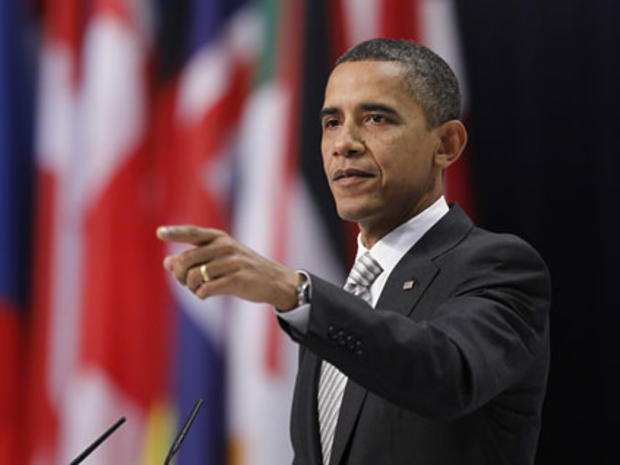Obama Faces Liberal Revolt over Tax Cut Deal
The battle over extending the Bush-era tax cuts has emerged as a defining moment for liberals disenchanted with President Obama, who they increasingly see as unwilling or unable to back up his campaign promises.
Mr. Obama vowed as a candidate to extend the Bush-era tax cuts for incomes below $250,000 for a couple or $200,000 for an individual - but let the cuts, which lapse at the end of the year, expire for incomes above those thresholds.
Republicans want the cuts extended for all income levels, including the wealthiest Americans. Though the American people favor Mr. Obama's position according to the latest CBS News poll, the White House and congressional Democrats appear poised to accept a temporary extension of all of the cuts this week.
The White House's apparent willingness to give in to the GOP on the tax cut issue - despite Democrats' large majorities in both houses of Congress (at least for a few more weeks) - is striking many on the left as emblematic of a president who they say has repeatedly failed to fight for what he believes in.
Liberal New York Times columnist Frank Rich this weekend explained "the baffling Obama presidency" in part by arguing that Mr. Obama "has seemingly surrendered his once-considerable abilities to act, decide or think." The president's attempts to seek out compromise instead of holding fast to a position, he wrote, has rendered him "indistinct" and "weightless."
Over at the liberal Huffington Post, meanwhile, the talk has turned to rallying around a serious primary challenge to Mr. Obama. While such a challenge is unlikely to materialize, the discussion reflects the level of disenchantment with Mr. Obama among the activist left.
"You don't have to be a rocket scientist nor have a PhD in political science and sociology to see clearly that Obama has abandoned much of the base that elected him," wrote Clarence B. Jones Sunday in a column calling on liberals to consider rallying around someone else in 2012. "He has done this because he no longer respects, fears or believes those persons who elected him have any alternative, but to accept what he does, whether they like it or not."
Daniel Roche, a 2008 Deputy Field Organizer in Nevada for Mr. Obama, is quoted in an email from the Progressive Change Campaign Committee saying that if the president "capitulates on this, there really is no point in voting for him in 2012."
"The difference between voting for a Republican and voting for someone whose default negotiation strategy is rolling over and dying whenever the Republican Party says mean things is marginal," he said. "This should be a ridiculously easy fight to win."
For liberals, the first half of Mr. Obama's term has been a long and so-far unfulfilled wait for something to rally around. The so-called "public option" never made it into the health care bill; "Don't Ask, Don't Tell" remains as military policy; immigration reform efforts have barely moved forward; the Guantanamo Bay prison facility remains open. Now comes the fight over the Bush-era tax cuts, which, barring a surprise outcome, marks one more disappointment for those who want to see the president fight for what he believes in.
"Like the public option, which enjoyed similar bipartisan consensus among voters, progressives are pushing President Obama to fight for both a policy winner and a political winner," Adam Green of the Progressive Change Campaign Committee said. "...President Obama has shown a complete refusal to fight Republicans throughout his presidency even when the public is on his side -- and millions of his former supporters are now growing disappointed and infuriated by this refusal to fight. Obama is demobilizing the troops and demoralizing the public right before he seeks re-election."
What liberals want to see is for Mr. Obama to stand firm on the issue, in part by arguing (perhaps in a holiday primetime address) that an America drowning in debt can't afford to give a handout to the richest Americans. As the Times noted Sunday, the $60 billion per year that would be saved by not extending the cuts for high earners would save as much as the elimination of earmarks, a federal pay freeze, a ten percent cut in the federal workforce and a 50 percent cut in foreign aid - combined.
From the White House's perspective, however, drawing the ire of what Robert Gibbs once dismissed as the "professional left" may well be worth it. The Republicans, after all, hold most of the cards: With the help of a handful of Democrats and the filibuster rule, they can (and have) blocked Senate Democrats' efforts to extend the cuts only for those making less than $250,000 (or, in a separate vote, less than $1 million). Lacking the votes to push through their position through the Senate, the White House and Democrats are left to either let the cuts expire for all Americans - which they see as bad for the economy, not to mention potential political suicide - or accept the GOP's terms, at least for a year or two.
And, the White House is stressing to reporters, it's not like they won't get anything for their trouble: The deal being negotiated between the White House and members of Congress will likely include a vote on extending long-term unemployment benefits (which expired last week) as well as some tax cuts important to the White House. The negotiation reflects the compromise necessary to get things done in Washington, they argue (behind closed doors, anyway) - and what's so bad about acknowledging political reality?
According to liberal Times columnist Paul Krugman, what's so bad is that Mr. Obama is essentially giving into GOP blackmail - and "if Democrats give in to the blackmailers now, they'll just face more demands in the future."
"So Mr. Obama should draw a line in the sand, right here, right now," he writes in his column today. "If Republicans hold out, and taxes go up, he should tell the nation the truth, and denounce the blackmail attempt for what it is. Yes, letting taxes go up would be politically risky. But giving in would be risky, too -- especially for a president whom voters are starting to write off as a man too timid to take a stand."
Such a potentially cathartic move would indeed be high risk, however - another promise Mr. Obama made during the campaign was not to raise taxes on the middle class. Republicans have been effective in blaming Democratic policies for the still-struggling economy, and while it's hard to know exactly how it would play politically if Mr. Obama let taxes for everyone rise, it's clear the GOP would aggressively cast the situation as the latest example of financial mismanagement by the party in power. The GOP is the stronger force in American politics at the moment, and it can be particularly difficult to enter a duel when it feels like the other side has all the momentum.
And despite the criticism from the "professional left," the White House knows that the perceptions of pundits like Krugman and Rich don't necessarily translate to the general public. According to the latest NBC News-Wall Street Journal poll, 90 percent of blacks still approve of the president, as do 82 percent of Democrats and 79 percent of liberals. That's not exactly the numbers one might expect for a man whom voters - at least in the Democratic base - "are starting to write off."
Still, there is a danger in the opinions of so-called "opinion makers" eventually trickling down to the general public. In his column Sunday, Rich compared Mr. Obama to Republican New Jersey governor Chris Christie, who is popular in his state despite its blue tint. (It should be noted that Christie has more executive control than Mr. Obama does, which makes it easier to stick to your guns.)
"...the core of Christie's appeal at home is that he explains passionately held views in concrete, plain-spoken detail," he writes. "Voters know what he stands for and sometimes respect him for his forthrightness even when they reject the stands themselves."
That's a quality sorely lacking in Mr. Obama, Rich and others say - even when he has the public on his side. And, they say, it has fed into the notion that the president is a wishy-washy Washington politician instead of a true champion of the middle class.
Perception is not necessarily reality, of course. The White House can point to financial reform, the health care bill, and the stimulus package as important liberal achievements, and Mr. Obama said even as he made his campaign promises that he was open to compromise in order to move forward. But for a president who has over the course of two years yet to deliver a single clear victory for the Democratic base that got him elected, the debate over tax cuts looks like the latest in a string of missed opportunities.
Brian Montopoli is senior political reporter for CBSNews.com. You can read more of his posts here. Follow Hotsheet on Facebook and Twitter.


